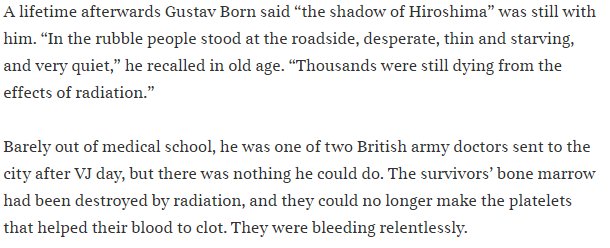Two days ago the obituaries editor came round and asked if I would like to write about someone who had done something important to do with platelets.
With an inward sigh, I said yes. I prepared to write the worthy-but-dull obituary of Gustav Born.
1/n
With an inward sigh, I said yes. I prepared to write the worthy-but-dull obituary of Gustav Born.
1/n
How did he become interested in platelets, I thought? Maybe I can eke an anecdote out of that. 

Anything of interest in his parentage to bulk things out? 

Einstein??! How on earth did they know Einstein? 

Any drama in his youth? (1) 

Any drama in his youth? (2) 

Any other unlikely connections in his life? 

I suppose that’s the end of the famous people though. 

His poor children. How do you follow that? 

Right, I’m unsurprisable. 

Anything you left out because it just got a bit ludicrous?
Well, he’s also related to Ben Elton and some chap called Martin Luther.
Well, he’s also related to Ben Elton and some chap called Martin Luther.
Oh, and he worked out how blood clots work and so saved hundreds of thousands of lives of people at risk of heart attack and stroke./END
thetimes.co.uk/edition/regist…
thetimes.co.uk/edition/regist…
Since this is going viral, here's a link for information about platelet donation:
platelets.blood.co.uk
platelets.blood.co.uk
Pps: anyone can read the full obituary for free by registering. thetimes.co.uk/edition/regist…
• • •
Missing some Tweet in this thread? You can try to
force a refresh


















